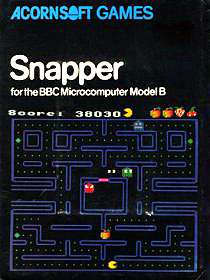Snapper (video game)
| Snapper | |
|---|---|
 Original version with Pac-Man type characters | |
| Publisher(s) | Acornsoft |
| Designer(s) | Jonathan Griffiths |
| Platform(s) | BBC Micro, Acorn Electron |
| Release | 1982 |
| Genre(s) | Maze |
| Mode(s) | Single player |
Snapper is a clone of the Namco arcade game Pac-Man[1] programmed by Jonathan Griffiths for the BBC Micro and released as one of the launch titles for Acornsoft in 1982. It was later released as one of Acornsoft's launch titles for the Acorn Electron in 1983.[2][3]

In development, the game was titled Puc Man (the first Japanese title of the arcade game was Puck Man) but the name was changed before release to avoid legal action. However, the initial release of the game was so close to Pac-Man (including the design of the game's characters) that this version had to be withdrawn and re-released with the characters changed.[4][5] The player's character became a round yellow face with very short legs wearing a green cowboy hat and the ghosts became skinny humanoid monsters.
As in Pac-Man, bonus items such as fruit would sometimes appear in the centre of the screen. The highest-scoring bonus item was an acorn, a reference to the publishers. When Snapper was killed, he would shrink and turn into small lines pointing in all directions.
The main difference in gameplay between Pac-Man and Snapper is the behaviour of the ghosts (or monsters). In Pac-Man, each ghost has its own personality and follows set patterns for each level. The red ghost also travels at double speed after a certain number of dots are eaten. In Snapper, the monsters begin each level by patrolling their corners a set number of times before breaking from their route to chase the Snapper. The time before breaking the route is reduced for each level until on later levels, the monsters chase Snapper almost immediately. The only real difference between the monsters is the corner they patrol and how soon they break from their route (e.g. the red ghost is always the first). Also, in Pac-Man, the main character slows when eating dots (so ghosts can catch up to him) but this does not happen in Snapper. These changes lead to a game which is much easier in the early levels but gets progressively more difficult[6] so games tend to last longer.
The game ran very smoothly, making it a popular release of the time. As it was written in machine code, rather than BASIC, it was much closer to the arcade version than earlier commercial releases on the BBC Micro such as Micro Power's Munchyman.
Snapper was also noted for starting the BBC Micro tradition of controlling arcade games using the Z, X, : and / keys for horizontal and vertical motion, since on most BBC models the arrow keys were not conveniently placed for gaming.[7]
References
- ↑ Jackson, Jane (December 1983). "The Micro User Games Software Review: Snapper Acornsoft". The Micro User (Issue 1-10). Retrieved 2010-10-03.
SNAPPER is an attractive and incredibly frustrating version of Pacman.
- ↑ Edwards, Dave A. "Snapper". Retrieved 2010-10-03.
1983: SNAPPER, Acornsoft, £9.20 (Tape), £16.50 (ROM Cart)
- ↑ Reed, Martin. "Electron Games Reviews: Play it Again Sam 7". Electron User (Issue 6.9). Retrieved 2010-10-03.
SNAPPER, Acornsoft's implementation of the ever-popular Pac Man, was one of the first games ever released for the Electron.
- ↑ Robinson, Oliver. "Only the Best BBC Micro Games". Retrieved 2010-10-03.
Snapper was one of the first Video Arcade Conversions made for the BBC by AcornSoft.
- ↑ Reeves, Alex. "Classic Retro Games". Retro Gamer. Retrieved 2010-10-03.
This is one of the many quality arcade conversions that Acornsoft created for the BBC Micro, being a very faithful example of Pac Man.
- ↑ Edwards, Dave A. "Acornsoft Snapper". Retrieved 2010-10-03.
The game gets progressively harder, and with higher scores as the fruit increase in value.
- ↑ Peter Rochford (April 1992). "Paradox". Beebug. RISC Developments Ltd. 10 (10): 17.
Keys are the usual 'Snapper' ones
External links
- Video clip of BBC Micro version (running at double speed)